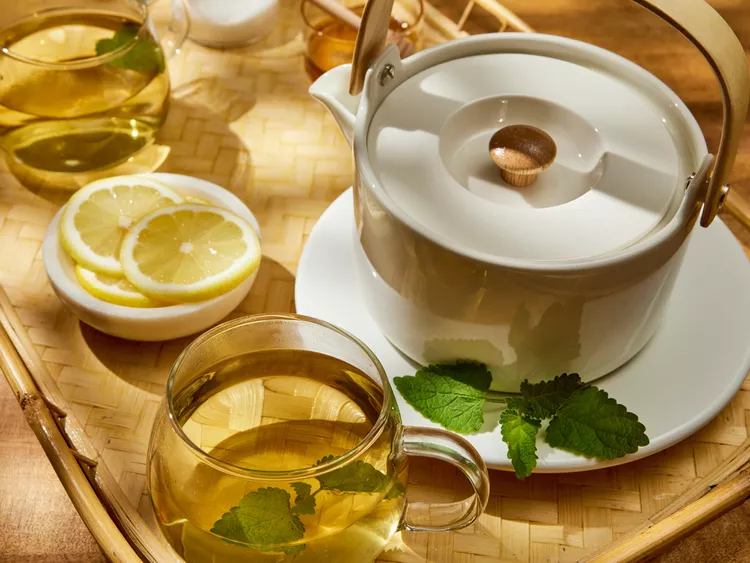Our Calming Lemon Balm Tea Recipe Is Packed with Benefits—Here’s How to Make It

A marriage of lemon and mint flavors makes this herb ideal for drinks and tea. If you grow lemon balm, you know how prolific it can be. Put your bounty of fresh herbs to good use, and make a cup of homemade lemon balm tea. Our recipe testers enjoyed the flavor with just a touch of honey.
What Is Lemon Balm?
Lemon balm is a perennial herb in the mint family. It's native to southern Europe, but has become popular across the United States. Lemon balm is easy to grow and like mint, spreads quickly. There are many benefits of lemon balm tea. The herb is known for its calming effects and has long been used to help reduce stress and lift spirits. Some even say the herb may have digestive, metabolic, and mental health benefits.
How to Make Tea Using Dried Lemon Balm
Dried lemon balm works well for this tea, too. Use 2 tablespoons dried lemon balm. Place dried lemon balm in a tea ball or strainer for steeping. Step as directed in the lemon balm tea recipe.
Ingredients
-
1/4 cup fresh lemon balm leaves (25 to 30)
-
4 cups boiling water
-
Honey or sugar, optional
-
1 slices lemon
Directions
-
Place lemon balm leaves in a tea pot. Add boiling water. Cover tea pot and let lemon balm steep for 10 minutes.
-
Strain tea into tea cups. Sweeten to taste with honey or sugar, if desired. Top each serving with a lemon slice.
Nutrition Facts (per serving)
| 5 | Calories |
| 0g | Fat |
| 1g | Carbs |
| 0g | Protein |
| Nutrition Facts | |
|---|---|
| Servings Per Recipe 4 | |
| Calories 5.3 | |
| % Daily Value * | |
| Total Fat 0.1g | 0% |
| Saturated Fat 0g | 0% |
| Cholesterol 0mg | 0% |
| Sodium 13mg | 1% |
| Total Carbohydrate 1.1g | 0% |
| Dietary Fiber 0.4g | 2% |
| Total Sugars 0.1g | |
| Protein 0.4g | 1% |
| Vitamin D 0mcg | 0% |
| Vitamin C 2.9mg | 3% |
| Calcium 29.6mg | 2% |
| Iron 0.9mg | 5% |
| Potassium 41.1mg | 1% |
| Fatty acids, total trans 0g | |
| Vitamin D 0IU | |
| Alanine 0g | |
| Arginine 0g | |
| Ash 0.4g | |
| Aspartic acid 0g | |
| Caffeine 0mg | |
| Carotene, alpha 0.1mcg | |
| Choline, total 1mg | |
| Copper, Cu 0mg | |
| Cystine 0g | |
| Energy 22.3kJ | |
| Fluoride, F 168.6mcg | |
| Folate, total 5.1mcg | |
| Glutamic acid 0g | |
| Glycine 0g | |
| Histidine 0g | |
| Isoleucine 0g | |
| Leucine 0g | |
| Lysine 0g | |
| Methionine 0g | |
| Magnesium, Mg 8.2mg | |
| Manganese, Mn 0.1mg | |
| Niacin 0.1mg | |
| Phosphorus, P 6.1mg | |
| Pantothenic acid 0mg | |
| Phenylalanine 0g | |
| Phytosterols 1.2mg | |
| Proline 0g | |
| Retinol 0mcg | |
| Selenium, Se 0.1mcg | |
| Serine 0g | |
| Theobromine 0mg | |
| Threonine 0g | |
| Vitamin E (alpha-tocopherol) 0.1mg | |
| Tryptophan 0g | |
| Tyrosine 0g | |
| Valine 0g | |
| Vitamin A, IU 101.5IU | |
| Vitamin A, RAE 5.1mcg | |
| Vitamin B-12 0mcg | |
| Vitamin B-6 0mg | |
| Vitamin K (phylloquinone) 18.6mcg | |
| Water 239.2g | |
| Zinc, Zn 0.1mg | |
*The % Daily Value (DV) tells you how much a nutrient in a food serving contributes to a daily diet. 2,000 calories a day is used for general nutrition advice.